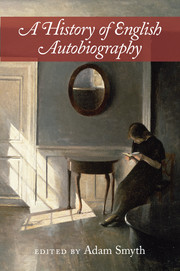Book contents
- Frontmatter
- Dedication
- Contents
- List of contributors
- 1 Introduction: The range, limits, and potentials of the form
- PART 1 AUTOBIOGRAPHY BEFORE ‘AUTOBIOGRAPHY’ (CA. 1300–1700)
- 2 Medieval life-writing: Types, encomia, exemplars, patterns
- 3 Autobiographical selves in the poetry of Chaucer, Gower, Hoccleve, and Lydgate
- 4 The radicalism of early modern spiritual autobiography
- 5 Inscribing the early modern self: The materiality of autobiography
- 6 Re-writing revolution: Life-writing in the Civil Wars
- 7 Money, accounting, and life-writing, 1600–1700: Balancing a life
- PART 2 RELIGION, GENDER, THINGS (CA. 1700–1800)
- PART 3 THE MANY NINETEENTH CENTURIES (CA. 1800–1900)
- PART 4 RELATIONAL LIVES AND FORMS OF REMEMBERING (CA. 1890–1930)
- PART 5 KINDS OF COMMUNITY (CA. 1930-CONTEMPORARY)
- Index
- References
4 - The radicalism of early modern spiritual autobiography
from PART 1 - AUTOBIOGRAPHY BEFORE ‘AUTOBIOGRAPHY’ (CA. 1300–1700)
Published online by Cambridge University Press: 05 March 2016
- Frontmatter
- Dedication
- Contents
- List of contributors
- 1 Introduction: The range, limits, and potentials of the form
- PART 1 AUTOBIOGRAPHY BEFORE ‘AUTOBIOGRAPHY’ (CA. 1300–1700)
- 2 Medieval life-writing: Types, encomia, exemplars, patterns
- 3 Autobiographical selves in the poetry of Chaucer, Gower, Hoccleve, and Lydgate
- 4 The radicalism of early modern spiritual autobiography
- 5 Inscribing the early modern self: The materiality of autobiography
- 6 Re-writing revolution: Life-writing in the Civil Wars
- 7 Money, accounting, and life-writing, 1600–1700: Balancing a life
- PART 2 RELIGION, GENDER, THINGS (CA. 1700–1800)
- PART 3 THE MANY NINETEENTH CENTURIES (CA. 1800–1900)
- PART 4 RELATIONAL LIVES AND FORMS OF REMEMBERING (CA. 1890–1930)
- PART 5 KINDS OF COMMUNITY (CA. 1930-CONTEMPORARY)
- Index
- References
Summary
All autobiographical writing requires a kind of double vision, at once retrospective and prospective. This is especially striking in the case of spiritual autobiography, which often presents the authorial self in relation to, and in terms of, both the sinful life that preceded the moment of writing and the new life that the writing portends. In the words of the familiar hymn, ‘I once was lost, but now am found; was blind, but now I see’: by elaborating on this rudimentary plot, the spiritual autobiographer re-narrates and recuperates the past in order to anticipate an as-yet-unnarrated future. In post-Reformation England, the genre itself occupied a similarly Janus-faced position: the earliest authors of English spiritual autobiography looked backward towards a variety of textual models, but in these retrospective engagements they also developed new ways of imagining and expressing personal experience. Early modern spiritual autobiography is thus ‘radical’ in both senses of the term: at once firmly rooted in extant models and conventions (recalling the word's etymology in the Latin radix, or root), and far-reachingly innovative, leaving an important legacy to English literature and its representations of subjectivity.
For the purposes of this chapter, I will define ‘spiritual autobiography’ as a free-standing account of some period of a Christian's religious life, written in the first person and read beyond its author's immediate circle. This is, of course, only one of the many forms that early modern Christian life-writing could take. To recover all the textual traces of the self and soul in this period, we would need to look farther afield: to letters and diaries, to the margins of record books and almanacs and bibles and genealogies, and even to published works on other subjects – biography, politics, philosophy – in which the author turns, briefly, to consider his or her religious experience. Recent work by Meredith Skura, Kathleen Lynch, Adam Smyth, and Brooke Conti, among others, has helpfully challenged Philippe Lejeune's definition of autobiography as a ‘retrospective prose narrative produced by a real person concerning his own existence, focusing on his individual life, in particular on the development of his personality’ (Lejeune 1989, 4). When applied to the early modern period, as the editors of a recent collection suggest, such a schematic definition excludes much of the ‘surprising range of traditions and genres’ that might be termed autobiographical (Dragstra, Ottway, and Wilcox 2000, 2–3).
- Type
- Chapter
- Information
- A History of English Autobiography , pp. 41 - 55Publisher: Cambridge University PressPrint publication year: 2016



